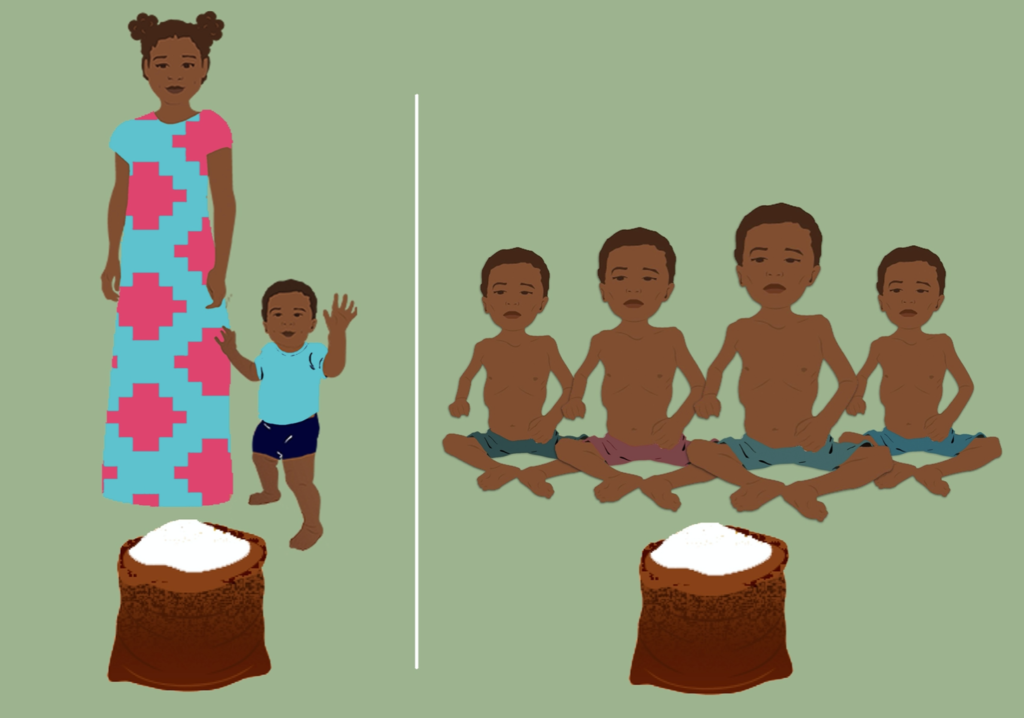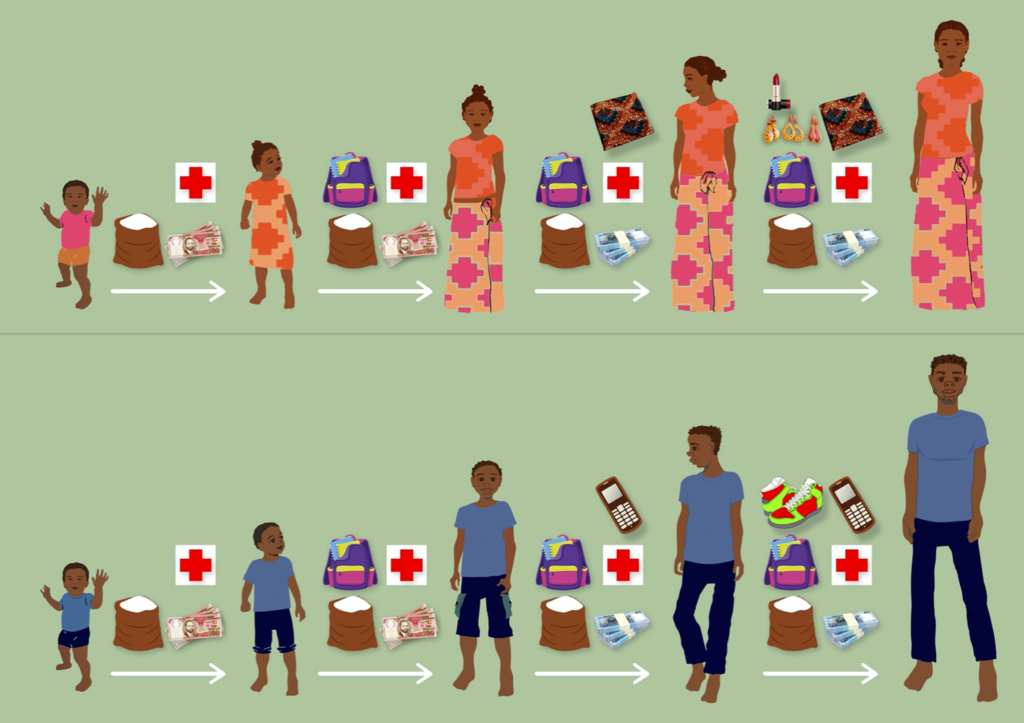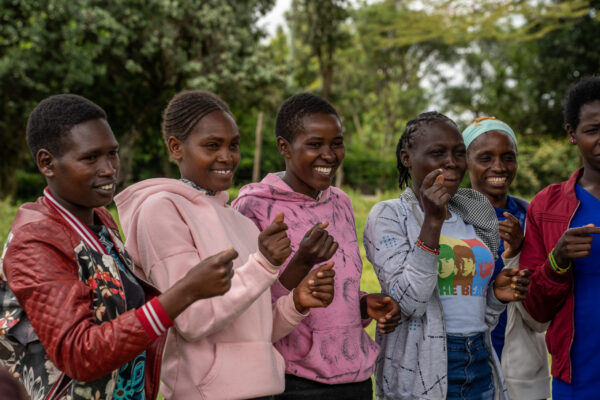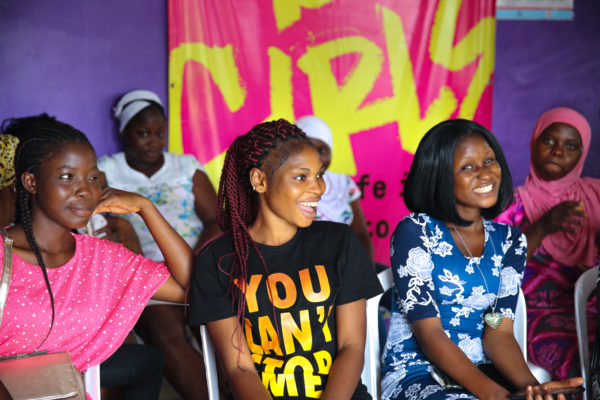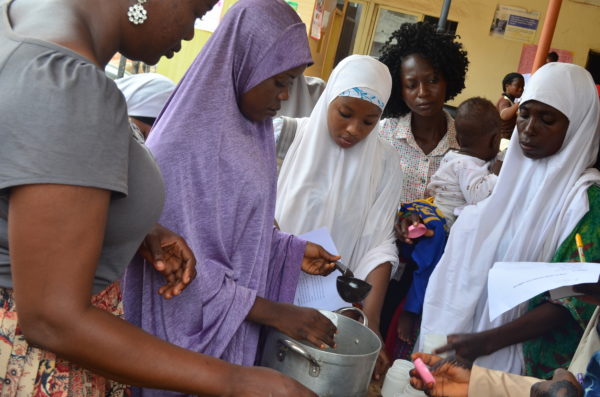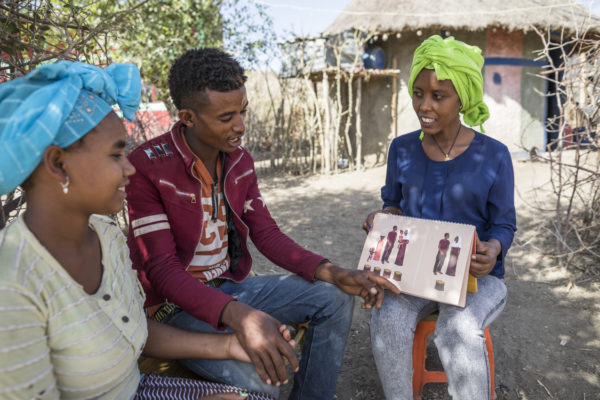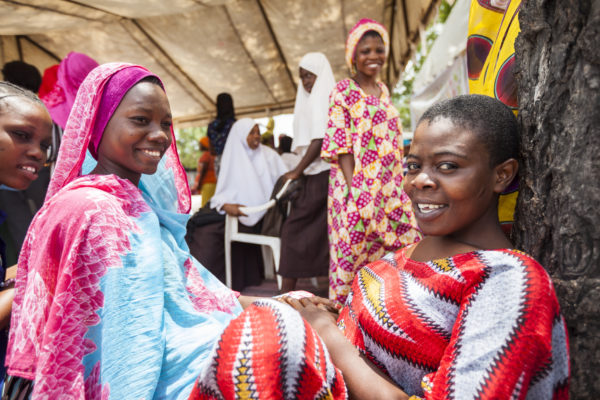In northern Mozambique, PSI’s Vale a Pena team faced a tall task: making contraception relevant to rural married girls aged 10-19 who, for a myriad of reasons, simply didn’t see its value.
For one, perception of contraception as a “family planning” tool often stands between young Mozambican girls with dreams of motherhood and their decision to take up a method.
To reframe perceptions, the team needed to broaden the lens by which Vale a Pena presented, and delivered contraceptive counseling.
> What is aspirational programming?
> Why bring an adolescent contraceptive program developed for rural Ethiopia to northern Mozambique?
> What can implementers takeaway as they, too, seek to respond to contextual challenges (even amidst COVID-19) through existing ASRH solutions?
1. Contraception is for girls with dreams
Q: What is an aspirational model to youth contraceptive programs?
It’s an approach that starts the contraceptive conversation through young people’s self-expressed life goals.
The entry point supports health workers to speak directly to what young people say they want and need, building trust among young consumers and respect for their choices.
Q: What is Smart Start?
Developed by Ethiopian young people for Ethiopian young people, A360’s Smart Start uses financial planning as an entry point to contraceptive counseling for rural, married girls aged 15-19 and their husbands.
And with an eye to replicating the intervention, Smart Start comes with one, big perk: its tools are simple… and easily adaptable to new contexts.
“Smart Start uses a discussion aide – a picture-based guide and corresponding script – to equip community-based health workers with the material and messaging to lead girls and their spouses through goal setting and financial planning,”
– Mary Phillips, A360 Ethiopia Technical Advisor, PSI
The dynamic, visual flip-book enables health workers to engage girls (both literate and illiterate) through a framing that speaks directly to what girls said matters to them: securing financial stability amidst changing times.
The conversation begins during a Smart Start session – and, with take-home tools, primes girls to continue the dialogue with their partners well after counseling, too.
“Smart Start goal cards, given to girls at the end of a session, allow girls to proactively initiate (or continue) health and life-planning conversations with their partners. For girls who opt for a contraceptive method, the goal card further provides a paper reminder listing the date for their follow-up session,”
– Mary Phillips, A360 Ethiopia Technical Advisor, PSI
Q: Why bring Smart Start to Mozambique?
Smart Start’s target population is rural, married adolescent girls – the same segment Vale a Pena aimed to but faced challenges in reaching. Low literacy. Remote settings. Early marriage. Social pressure to start a family. High unmet need for contraception among both populations.
It was a demographic match-up.
“Young Ethiopian couples, like young Mozambican couples, wanted better quality lives for themselves, and their families. Girls’ insights in Ethiopia, and Smart Start’s resulting orientation, aligned with and responded well to the insights Vale a Pena was gaining about married girls in northern Mozambique and their desire to continue their education and pursue a career,”
– Seyoum Atlie, A360 Deputy Director, PSI Ethiopia
2. From one context to the next
Q: What supported the Mozambique team to introduce Smart Start into a new environment?
In short: A360 team members’ technical assistance, on-the-ground in Mozambique. That learning, however, came to light after some trial and error.
“A360 has long grappled with how to replicate the project across new contexts. Smart Start’s tools can be easily translated into another language, but the knowledge around why the tools were developed, how they’re meant to be implemented and what reactions we want them to evoke from consumers and/or health workers is integral. That combination equips the ‘new’ team to replicate A360 with fidelity to the intervention’s intended user experience,”
– Mary Phillips, A360 Ethiopia Technical Advisor, PSI
At first, the A360 Ethiopia team provided virtual technical assistance, liaising with the Mozambique team’s external design firm. From afar, A360 could offer guidance – but wasn’t equipped to infuse the design and prototype development with real-time A360 institutional knowledge. As a result, the design firm missed A360 Ethiopia’s early findings: Smart Start only works for rural, married girls.
“Our design firm first tested Smart Start with unmarried girls and their partners. But Smart Start fell flat when used for girls and their boyfriends. Sure they were having sex, but they had no interest in sharing life plans together,”
– Ryan Kelley, Country Representative, PSI Mozambique
Smart Start’s life planning orientation, therefore, simply didn’t resonate.
“That first round of prototyping lacked the passion, vision and expertise needed to make an adapted version of Smart Start work. But we knew we had a good product, we just needed the guidance to make it work,”
– Ryan Kelley, Country Representative, PSI Mozambique
The team was back to the drawing board – this time, with A360 Ethiopia staff replacing the design firm to join the Vale a Pena team on-the-ground for prototyping, round two.
“Being in Mozambique allowed us to quickly pinpoint areas of alignment, and misalignment. Sure, you can take Smart Start’s discussion aide, translate it and make some surface adaptations.
Anyone can test it out, but you need a deep understanding of what the tool is designed to do and the reaction it’s meant to elicit. Without that knowledge, Smart Start can be hard to test; with it, Smart Start is interesting to replicate.
It is amazing how consistent girls’ reactions are from Ethiopia to Mozambique. You ask girls for their favorite page of the Smart Start flip-book, and it’s almost always the graphic of the three types of families that girls can choose from when discussing their dreams for their futures. I think it’s because the picture shows them that they have the ability to choose,”
– Mary Phillips, A360 Ethiopia Technical Advisor, PSI
And as Phillips notes: girls’ reactions in Ethiopia mirror those of girls in Mozambique.
“We saw this in Ethiopia, and we found it yet again in Mozambique: everybody wants to be that third family! They want a cow, a house and children. It sets up this hopeful tone, and offers a natural segue into conversation around the tools to help couples achieve their goals,”
– Mary Phillips, A360 Ethiopia Technical Advisor, PSI
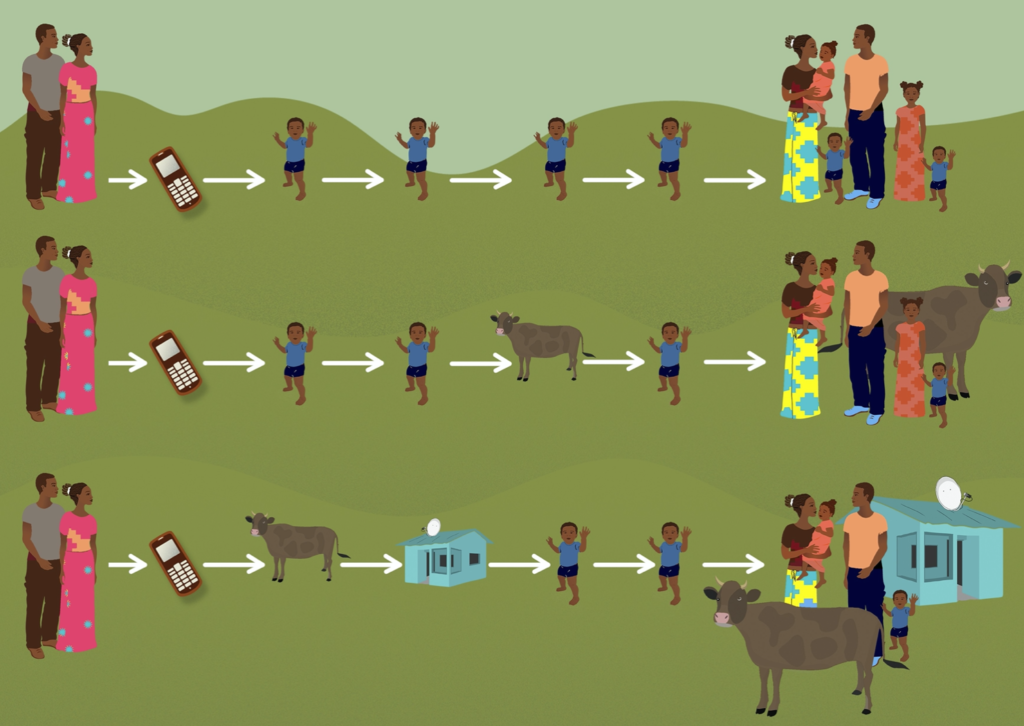
3. Embracing Adaptations
Q: You can’t take a one-size-fits all approach to replicating an intervention. How did the team adapt Smart Start for the Mozambican context?
A360 and Vale a Pena both took a Human-Centered Design (HCD) approach to design. The experience primed the teams to move fast as they iterated on a new prototype.
“In prototyping, you know you are going out with imperfect products to test assumptions. We started by taking everything out that was not appropriate for a Mozambican context – like the clothes couples are pictured wearing– and left the rest in with the goal of getting the feedback we’d need to land the right replication.
Our HCD experience, on top of the insights girls shared during A360’s original design phase, equipped us to move fast; to understand that we didn’t need hours on hours, head down in a boardroom to refine Smart Start for Mozambique. We took one week to iterate in response to feedback loops,”
– Ryan Kelley, Country Representative, PSI Mozambique
The team made quick, surface-level changes, tailoring Smart Start’s discussion aide to be… more northern Mozambican.
“As soon as we stepped into the field, it was clear that Smart Start’s original earthy palette looked nothing like northern Mozambique’s lush greenery amidst low, rolling hills. We needed to make Smart Start’s Mozambique prototype much more green.
We also changed the couples’ outfits; in Ethiopia, men wear white caps; but in Mozambique, the white cap resembles garb worn among observant Mozambican Muslim families, which many girls among our target population don’t relate to. We removed his hat, and ‘dressed’ the wife in more traditional clothing, instead, to make the images applicable to all – across ethnicities and religions,”
– Seyoum Atlie, A360 Deputy Director, PSI Ethiopia
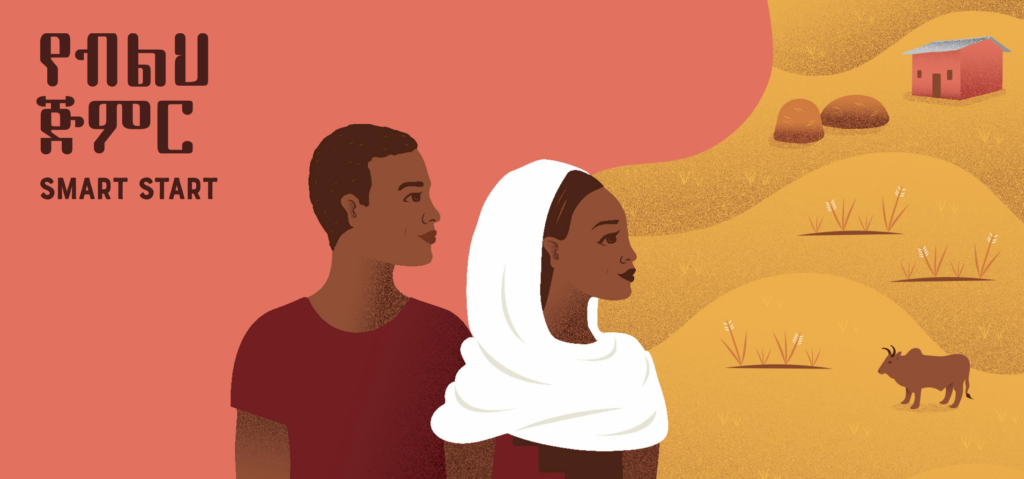

The team further refined how the aide presented content around life goals and saving resources.
“Ethiopia embraces a storytelling and symbolic culture; Smart Start’s original visuals of couples with only one kid in Ethiopia are understood by Ethiopians as symbol of starting a family, however many children parents choose to have.
But in Mozambique, a literal approach trumps the symbolic approach. A picture of one kid implies the couple is only having one child – an intolerable idea among the local context; therefore, we updated Smart Start’s visuals to show a family with two kids (an older and younger child to reinforce birth spacing).
We also broadened the examples offered around aspirations; we added in pictures of goats, beer, lipstick, earrings, vibrantly-colored shoes and a cell phone. Indeed, in Mozambique, acquiring a cell phone comes before starting a family!
And we amended how we introduce financial planning. In Ethiopia, Smart Start addresses financial planning through math. But in our target regions, it’s easier to talk in ‘cattle,’ which, for locals, is currency.
We’d ask them how much time they thought it might take them to save resources to achieve their life plans, before talking through ways they could increase their savings (namely, number of cows) to reach their goals,”
– Ryan Kelley, Country Representative, PSI Mozambique
The team worked alongside health workers to refine the script used to counsel girls.
“We worked with the mobilizers to tailor the script and practice it – they got it down in a day! The script allows the promoters and girls to interact more substantively than the videos the Vale a Pena team previously used to initiate ASRH dialogue. It allows them to correct misunderstandings and build rapport with girls and their husbands,”
– Mary Phillips, A360 Ethiopia Technical Advisor, PSI
Q: A360 designed Smart Start to engage husbands, too.
But differing gender dynamics in the Mozambique context meant the team would need to adapt how Smart Start brings partners into the contraceptive dialogue. What did the team learn?
For context: in Ethiopia, girls told the A360 team that they wanted to discuss their SRH options with their husbands – but simply didn’t know how to begin that conversation. Smart Start offered a way to initiate joint decision making among couples.
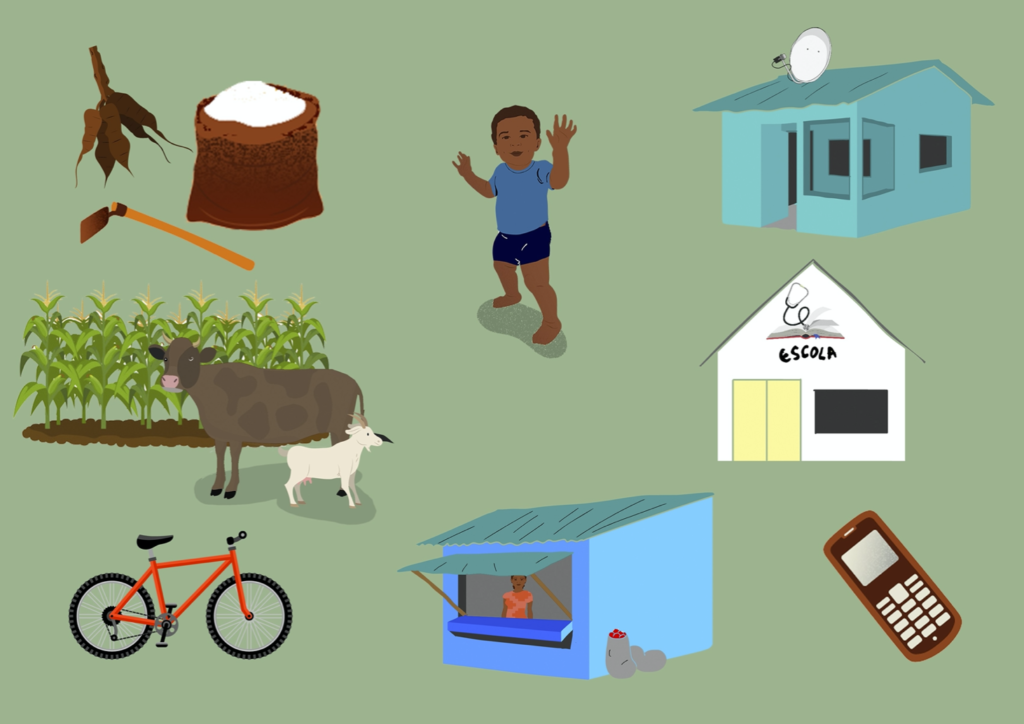 The data, too, proves the value of engaging spouses; three in five Ethiopian girls will voluntarily adopt a contraceptive method when their husbands take part in a Smart Start session. (In contrast, roughly one in two girls will take up contraception when her husband is not present.)
The data, too, proves the value of engaging spouses; three in five Ethiopian girls will voluntarily adopt a contraceptive method when their husbands take part in a Smart Start session. (In contrast, roughly one in two girls will take up contraception when her husband is not present.)
In Mozambique, however, the Vale a Pena team expressed hesitation. Men didn’t want to engage in ASRH conversations with young female mobilizers nor with their wives present – despite expectations by men that girls speak to their husbands prior to choosing a method.
Challenges – sure. But opportunities, too.
“We were in the midst of a session with a married girl when her husband, who had been showering at our time of entry, came out into the compound. His anger was palpable seeing us engaging with his wife. Mad that we were in the compound – he sits on the stool facing away from us. But as the youth-friendly promoter kept going through the Smart Start manual, we could see his interest perk up,”
– Mary Phillips, A360 Ethiopia Technical Advisor, PSI
Every girl in Mozambique who opted to take a contraceptive method, did so after having talked with their partners. The recommendation? Keep testing with husbands.
“Husbands may just need be engaged differently; we’re testing using male mobilizers instead. And girls may just need to be supported to share this information with their husbands, either through the Smart Start referral card’s visual aids or through follow-up visits,”
– Seyoum Atlie, A360 Deputy Director, PSI Ethiopia

4. Serving the Health System, Too
Q: How were Mozambican health workers trained on Smart Start?
With PSI Mozambique-trained providers and mobilizers embedded in public health clinics and communities, training health system actors on using Smart Start proved seamless.
“Vale a Pena mobilizers, as with A360 Ethiopia’s navigators, were already working at the community-level to engage girls with ASRH services and information. Our Community Assistant, who supervises the mobilizers, could play the role of A360 Ethiopia’s Adolescent Health Officer.
And PSI Mozambique’s Tem Mais nurses, who are seconded at youth-friendly health centers, could take on what the Health Extension Workers (HEWs) in Ethiopia do (specifically, counseling girls). As a bonus, the Mozambique team has direct oversight over the nurses and thereby, are better positioned to address quality control. Less work is needed on provider attitudes and behaviors,”
– Ryan Kelley, Country Director, PSI Mozambique
5. Replicating an intervention? The 1 thing you should know.
Keep it simple. There’s no need to reinvent the wheel.
“Developing interventions does not need to be a tortured process of trying to figure out what is happening. If there is a demographic match, like young married girls in rural areas, why not prototype by using an existing starting point to target the same population?”
– Mary Phillips, A360 Ethiopia Technical Advisor, PSI

Learn more about how Mozambique’s Vale-a-Pena intervention is applying the A360 Blueprint for AYSRH Change to reimagine how young Mozambicans access modern contraception, today.


